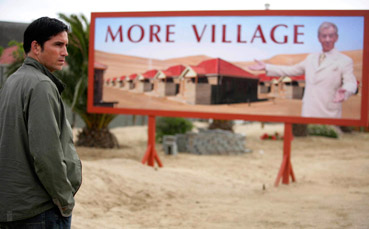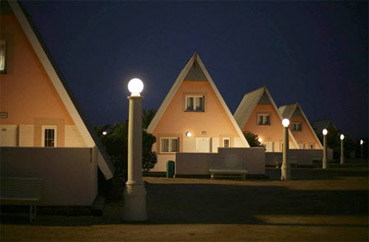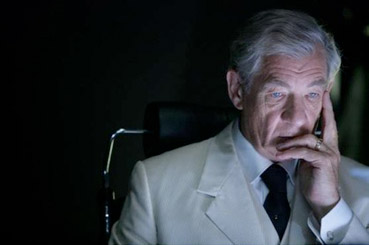"McKellen may be a sublime combo of the Wicked
Witch and the Wiz, but Caviezel is no Dorothy." |
Robert Bianco, USA Today |
There is a spoiler in this preview but as you're not going to know it when you read it, it's more of a mind game that may have you scurrying back to the site to see if you can un-scramble it once you've seen the show (or indeed if you chose to see the show...)
The remake of Patrick McGoohan's groundbreaking series aired in the US in November of the same year that the original prisoner was finally 'released'. McGoohan died on the 13th January 2009 and as much as this saddened me, 80 is not a bad age at which to bow out. I'm not sure what the idiosyncratic Irishman would have made of Bill Gallagher's take on the Village and its numbered inhabitants. God knows, the man did his bit to nudge the world artistically speaking. ITV screen the (what else but) six-part series starting this Saturday (17th April 2010). Word of a remake of McGoohan's era-defining series was released some years ago. AMC, the company behind the exquisite Mad Men, was producing the venture. Being rabidly enthusiastic about the original, I felt – with some trepidation – that if I was going to get my TV art compromised, at least it was by someone good looking and rich. At least the programme makers were going to make an effort. This wasn't some cheap knock off. It was an ambitious re-imagining (to use the popular and frankly silly parlance) that cost a small fortune.

Stateside, reviews were mixed and it's easy to see why. While ambitious, huge in scale and snuggly fitting into the 21st century TV landscape (that's not a plus for anything connected to the world of The Prisoner), the new series is not groundbreaking in any way except literal and as that's a bit of a spoiler, I'll leave the remark suitably enigmatic. It's precisely of its time while McGoohan's show is timeless. And it could not do what McGoohan did because our broadcast culture is now as risk averse as a coma patient in a padded cell. Programme makers are not experimenting on prime time TV now – more's the pity. McGoohan had the clout and used it to create something extraordinary. We simply do not live in that world anymore but the terrible irony is that we do live in the world McGoohan created. I am a number... I am many numbers. And so are you.
The Prisoner (1967) and The Prisoner (2009/10) are essentially incomparable. The intervening 42 years may signify Douglas Adams' numerical answer to life, the universe and everything but those years also highlight the near infinite abyss between two very diverse cultural zeitgeists. The world was making wildly optimistic, grand gestures in the late sixties and there was a sense that the human being's potential was gazing upon and reaching towards the key to its own lock. We landed on the frickin' moon for Christ's sake. Freedom enticed. We would not be pushed, filed, stamped, indexed, briefed, de-briefed, or numbered. Our lives were our own. We were not numbers. Along came a technology that at least twice was broadly criticised by No. 6 in the Village and now? We are all numbers in a digital age, how could we not be? Each of us is at least twenty numbers... You can't live any kind of a life without being a number today. Welcome to your own Village because you may not know it but McGoohan wasn't just an actor/writer/director dabbling in entertaining the masses. He was a goddamn prophet. And we're living in a world he was fearful enough to warn us about. We paid no heed and now are paying a high price for our own imprisonment.
Any cursory glance at a newspaper or news web site confirms that our raging apathy, ignorance, lack of reason and cruelty have surged back as if they'd been kidnapped forty years ago and some idiot had paid the ransom. We are broken again. Some of us think that fixing us will take away the essential 'us'ness of us. Others believe that redemption is a faith issue. You will notice that the church that Two (McKellen) visits in the new series has no denominational identity. Handy for the fact that this is the one location where Two's woes and the world's own fears become manifest. We cannot believe our way out of this prison of our own making. In fact shedding some beliefs seems to be one way to go. Imagine a world where at the supermarket check-out, the person at the till asks not if you have a loyalty card but if he/she can take away one of your cards. Lose another number. I'm looking into the future and it's all about a return to simplicity – a name for a new Village... 'Simply City'. Speaking of cities...

If a nuclear device explodes in one, its effects reverberate for generations. If the same device is detonated in a desert, the human cost is minimal. McGoohan's original The Prisoner wrought creative havoc with its wide ranging and long-lasting, knock-on effect on both our culture and television itself. AMC's re-imagining of The Prisoner is actually located in a vast desert and the metaphor works because we live in a very, very different world now. A new Prisoner doesn't have the context to be anything other than a TV show no matter how illuminating or entertaining. McGoohan set the literal ball roving and from those daring ideas came creative elements in shows like Lost and Battlestar Galactica. Yes, The Prisoner was and is an allegorical show with the DNA of 1984 and Kafkaesque flavouring but it presaged so much we're living with now, things we stupefying call 'normal'. How many numbers are you in 2009? Count them. All is context.
So AMC had to approach a re-imagining as a satisfying four and a half hour mini-movie set in the context in which we now find ourselves. This was a double-edged sword. AMC had to acknowledge the post 9/11 milieu but also deliver something dramatically satisfying which would not be a re-run of ideas already re-ran and pored over by other shows. And I'm pretty sure there was an executive order to have the new series make sense at the end. Oh dear. McKellen actually defends this point with some rigour nodding at the original's lack of sense. I disagree. Drugs, alternate realities, parallel universes, altered states... we'd run the gamut. There is, essentially, nowhere else to go. If you approach the new series daring it to be as controversial or as eclectically smart as the original then you won't enjoy it. To really have fun with its own concepts and ideas (a nod of appreciation to writer Bill Gallagher), you have to be completely ignorant of the original series (and preferably as ignorant of the existence of the work of Philip Kendred Dick, The Matrix and... the list is long – a near impossibility for you if you've read this far).
For what is the new series but a plaintive cry for order and happiness out of the perceived global chaos and personal strife at the terrible expense of personal liberty. As Two became 'Untwo' in the show 'Schizoid' ('unto' – biblical nods very intentional I suspect) and Six became One in 'Checkmate', I imagined a union between Caviezel and McKellen – the perfect blend of stoic and dreamer, the benign dictator some think would be the best form of government... No. 2 and No. 6 together... Or put another way, in ruler terms, that's 'half a crown'. Two and Six. One thing I will give the new film-makers – kudos for the balls to feature front and centre an ending so bleak it would make McGoohan raise an eyebrow.

Part of the fabric of the original was wrapped around the character of No. 6's leading man. There were famous tales of how he refused to kiss anyone on screen and many reminders of his staunch Catholicism. I think we have to nod to George Markstein as co-creator but let's be frank. The Prisoner (1967) was Patrick McGoohan's state of mind Rorschached on to the small screen. McGoohan's dazzling original was one man using art to make sense of his place in the world and it was a dangerous place. There was never any sense that McGoohan was not in mortal peril in the Village. In McKellen's desert Village, that sense of physical danger is missing. It's more of a puzzle than a nightmare. Its enforced serenity has a curious consequence. It's supposed to be alarming but it has the opposite effect, something almost soporific. Must be the desert heat.
There are many things to enjoy in this new mini-series. McKellen tops the list. His Two is suitably creepy, intimidating and yet in certain places warm. Writer Gallagher has really got his teeth into the head of the Village and this has a downside. Six is supposed to be the star but Caviezel plays it (or is directed to play it) as second fiddle. He's there to give McKellen someone to play with. Six never blossoms as the ever-rebel, the man who "...makes putting on his dressing gown, an act of defiance." If McGoohan was a steam-train, Caviezel's a Ford Granada, a bit bland and not fleshed out enough to carry the whole show. We simply don't care enough. Production design is quirky and there are three decisions made, elements that feature to supposedly help Six and/or the viewer understand what the Village is – it's too much and in the context of filmed drama in 2010, AMC's Prisoner is simply not original enough. In 1967, The Prisoner was the very soul of originality. What's to compare with it today?
|